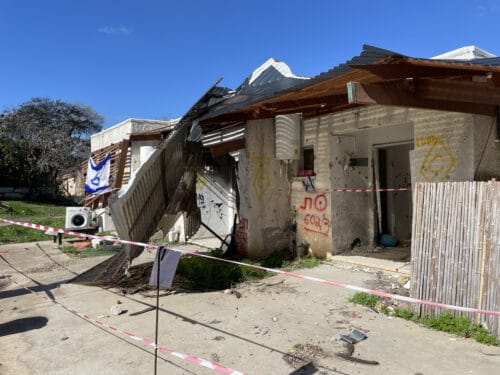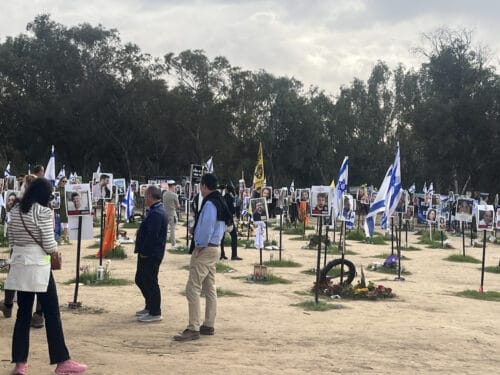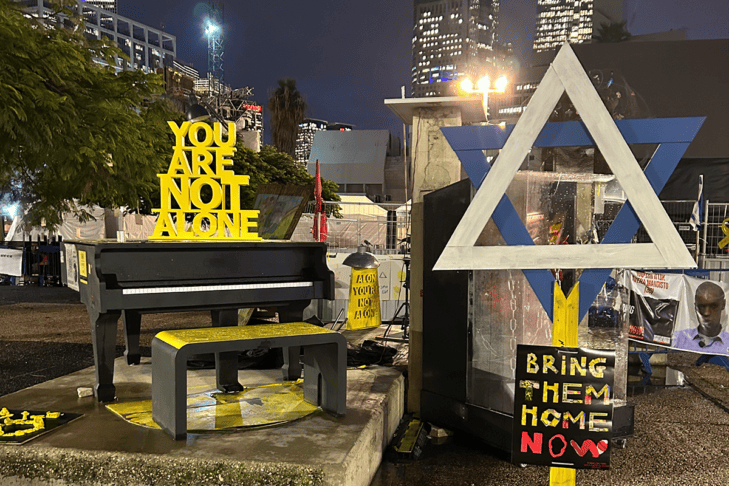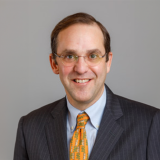“But is it safe?” We were asked that question countless times when my husband and I allowed our 19-year-old son to return to Israel in early December. I usually responded with, “Have you ever ridden in a car when he’s driving?” My answer reflected my own discomfort with both the question and any serious answer that I might provide.
After visiting Israel last week, I hear that question differently. “But is it safe?” is a question we can only ask as we sit thousands of miles away from the war, the murders, the rapes, and the kidnapping of innocent children, women, and men. To answer the question, we must dig deep for hope and resilience because, as parents, the answer must be, “Yes, it is safe.”
While on a solidarity mission organized by CJP, we met many Israeli parents who did not get to ask, “But is it safe?” For those parents, whose sons and daughters were dragged from the young peoples’ village of Kibbutz Kfar Aza, the question was devastating but irrelevant. Many of those who were not taken hostage were burned alive in their homes or shot trying to escape the fires. Our guide, Chen, a resident of Kfar Aza, is only alive because she was away on Oct. 7. Her friends and neighbors who saved her father were murdered by Hamas. A mom of young children hid in her safe room while hearing the cries of her friends and her children’s friends being murdered or dragged off as hostages. She contemplated whether to kill her own children and herself rather than allow them to be taken hostage. Somehow, she and her children survived; now, she will live forever remembering how she considered taking her children’s lives to spare them from the horrors and cruelty of the terrorists.

Prior to these atrocities, many of the residents of Chen’s kibbutz and the other nearby kibbutzim drove Gazan children and adults to doctors’ appointments in Israel. They strove for peace and to build bridges between Palestinians in Gaza and Israeli Jews. They know now that some of the Gazans who worked in these kibbutz communities mapped the layout and reported details back to Hamas to allow for maximum killing and destruction on Oct. 7. Some of the kibbutz residents who had driven Gazans to medical appointments and gotten to know them told us that they could no longer feel compassion for Gazans. They felt sad and ashamed to admit that their hearts had understandably shrunk. What does the question “Is it safe?” even mean to people who have experienced such betrayal and devastation?
The parents of Israeli 19-year-olds cannot ask and are not asked, “Is it safe?” before their children are deployed to war zones in Gaza and the northern border of Israel. We visited young men and women in a rehab hospital attempting to heal from their physical injuries and trauma.
I also met members of a kibbutz who were moved out by the army after Oct. 7 and recently were told that it is safe to return. The residents asked the army: “Will we and our children still have only 15 seconds from the sound of a siren to get to a shelter?” “Yes.” “Will our children hear artillery fire when they leave their homes?” “Yes.” “Will our children have to walk by the burnt-out houses and take the school bus where they saw their murdered neighbors strewn alongside the road on Oct. 7?” “Yes.”
“Is it safe?”
We met with Hersh’s parents, Rachel and Jonathan. Hersh was taken hostage on Oct. 7 after attending the Nova music festival, where roughly 400 young people barely older than my son and daughter were murdered. We know that many women were brutally raped before being executed and 40 young people, including Hersh, were taken hostage. Hersh was my son’s counselor on his school trip to Israel last spring. He had been excited to learn that our son and several of his classmates were returning to Israel last September. Hersh offered to take our son to a soccer game before he left for Thailand. He has not yet made it on that trip. Rachel and Jonathan didn’t get to ask Hersh, “But is it safe?” before he left for the concert; perhaps it didn’t even dawn on them to wonder whether a music festival for peace would be precisely the opposite. They now ask us all to keep his name, and those of the other hostages, on the top of our minds and keep telling their stories. The resilience and tireless efforts of the hostage families to bring their loved ones home was empowering.

Chen shared that she still believes in peace. When she showed us around her destroyed kibbutz, I asked her how. She answered that she honestly wasn’t sure, but that she needed to sustain that capacity. I met with an alum of Seeds of Peace (a program for Israelis and Palestinians to develop relationships and tangible paths toward lasting peace) the day before he was to be deployed to the north as a reservist. He requested a deployment in the north to avoid combat with the Palestinians and their families whom he knew and with whom he was friends. He, too, continues to believe that peace is possible. He chose to share his precious time with me before his deployment to convey that message to at least one American.
On Oct. 7, when Hamas attacked, I was visiting my son in Israel. We were staying in Jerusalem and spent much of the subsequent 48 hours learning bits of what was happening in the south. We heard sirens and returned to bomb shelters many times that Saturday. I brought my son home to Boston on Oct. 9, and we let him return on Dec. 11. If I am asked now, “But is it safe?” my answer will be that it has to be and that each of us must dedicate ourselves to making it so.



